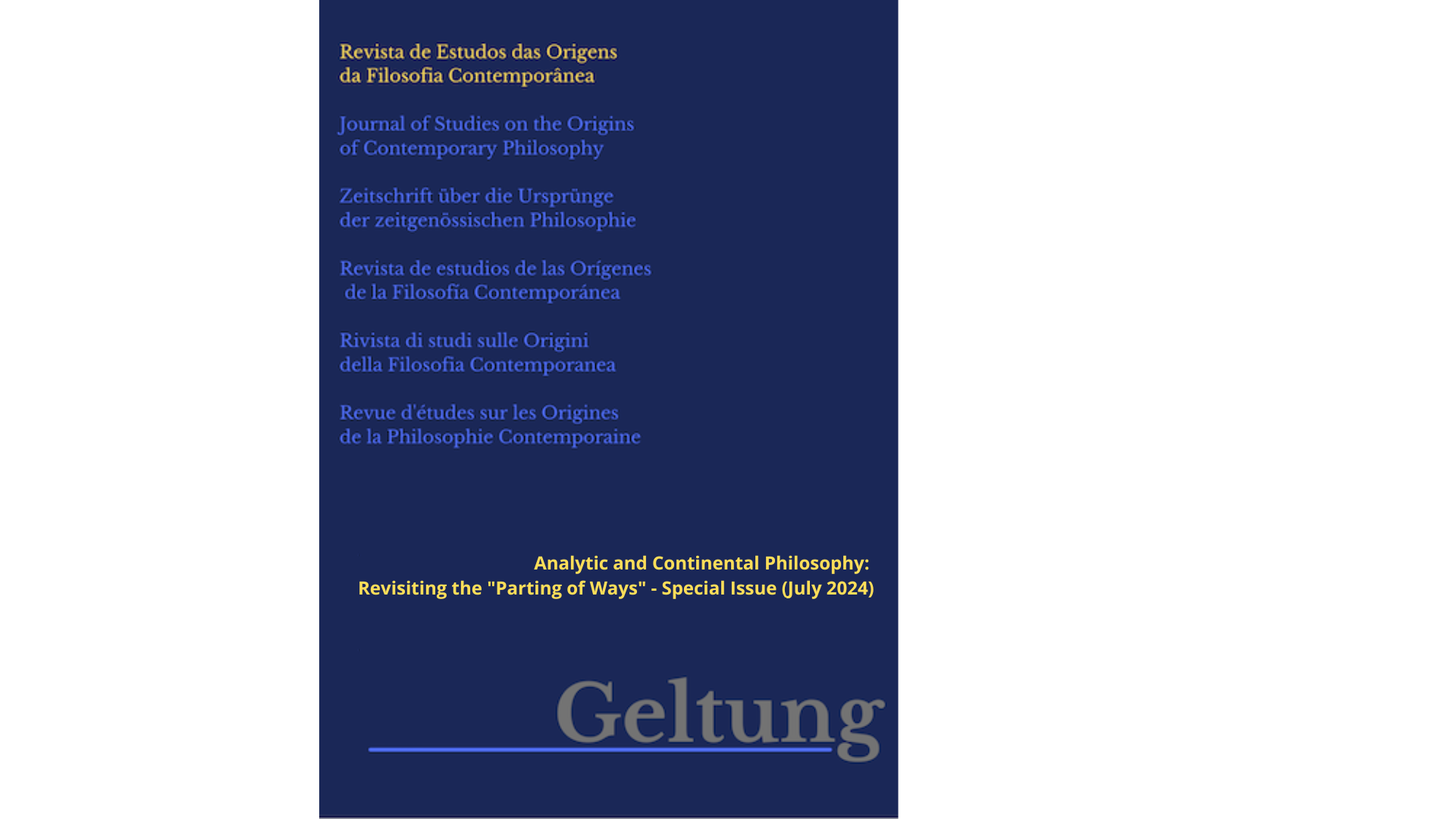Another way of parting
Horkheimer, Schlick, Bergson
DOI:
https://doi.org/10.23925/2764-0892.2024.v2.n2.e66032Keywords:
Logical Empiricism, Critical theory, Lebensphilosophie, Henri Bergson, Max Horkheimer, Moritz SchlickAbstract
Despite its formative influence on the subsequent emergence of a supposed ‘divide’ between ‘analytic’ and ‘continental’ philosophy, the clash between the phenomenological tradition and early analytic philosophy is only a small part of a much broader, complex, and multi-faceted ‘parting of the ways’ between various strands of interwar Germanophone philosophy. It was certainly more than two parties that parted their ways. As Friedman (2000) rightly saw, this ‘parting’ was indeed largely an outcome of the post-war context of Neo-Kantianism’s ‘decline’. The ensuing power vacuum generated clashes between multiple philosophical tendencies vying for the institutionally dominant position previously occupied by the Neo-Kantian schools. This power-struggle included, apart from Cassirer’s last stance in defence of Neo-Kantianism, not only the Logical Empiricists and the various offshoots of the Phenomenological tradition, but also Lebensphilosophie, Philosophical Anthropology, and the Frankfurt School. This paper will trace a path through some of the tendencies involved in the abovementioned ‘parting of the ways’, in an effort to bring some of them back into dialogue. I will focus on exploring one specific facet of Horkheimer’s account of the ‘parting of the ways’, namely his critique of the notion of givenness. The overall goal of the paper will be to set up a dialogue between three parting ways towards givenness: Horkheimer’s polemic against the Logical Empiricist myth of the given, Schlick’s polemic against the Bergsonian myth of the given, and the Bergsonian methodology of intuition.
References
References:
Adorno, T. W. 1977. “The Actuality of Philosophy.” Telos, 31: 120-133.
Adorno, T.W. [1966] 1973. Negative Dialectics. Translated by E. B. Ashton. New York: Continuum.
Adorno, T.W. 1993. Hegel: Three Studies. Translated by Shierry Weber Nicholsen. Cambridge, Massachusetts: MIT Press.
Anonymous. 1915. ‘Notes and News.’ The Journal of Philosophy, Psychology and Scientific Methods, 12(15):418-420.
Bataille. Georges. [1951] 1986. ‘Un-knowing and its Consequences.’ Translated by Annette Michelson. October, 36:80-85.
Bowie, Andrew. 2000. “The Romantic Connection: Neurath, The Frankfurt School, and Heidegger, Part two.” British Journal for the History of Philosophy, 8(3): 459-483.
Canales, Jimena. 2015. The Physicist and the Philosopher: Einstein, Bergson, and the Debate That Changed Our Understanding of Time. Princeton: Princeton University Press.
Čapek, Milič. 1971. Bergson and Modern Physics: A Reinterpretation and Re-evaluation. Dordrecht: Reidel.
Carnap, Rudolf, Hans Hahn, and Otto Neurath. [1929] 1973. ‘The Scientific Conception of the World: The Vienna Circle.’ In Neurath, O., Empiricism and Sociology, edited by Marie Neurath, Robert S. Cohen, 299-318. Dordrecht: Reidl.
Carnap, Rudolf. [1928] 2003. The Logical Structure of the World: And Pseudoproblems in Philosophy. Translated by Rolf A. George. Chicago: Open Court.
Carnap, Rudolf. [1931] 1959. ‘The Elimination Of Metaphysics Through Logical Analysis of Language.’ Translated by Arthur Pap. In Logical Positivism, edited by Alfred J. Ayer, 60-81. Glencoe, Illinois: The Free Press.
Carnap, Rudolf. 1935. Philosophy and Logical Syntax. London: Kegan Paul, Trench, Trubner and Co.
Chen, Bohang. 2019. “Revisiting the Logical Empiricist Criticisms of Vitalism.” Transversal, 7:1–17.
Costelloe, Karin (Mrs. Adrian Stephen). 1914-1915. ‘Complexity and Synthesis: A Comparison of the Data and Philosophical Methods of Mr. Russell and M. Bergson.’ Proceedings of the Aristotelian Society, 15(1):271-303.
Creath, Richard. 1992. Carnap’s Conventionalism. Synthese 93 (1/2): 141–165.
Dahms, H. J. (1994). Positivismusstreit, Die Auseinandersetzung der Frankfurter Schule mit dem logischen Positivismus, dem amerikanischen Pragmatismus und dem kritischen Rationalismus. Frankfurt: Suhrkamp.
Daum, Adam. 1982. ‘Schlick’s empiricist critical realism.’ Synthese, 52(3):449-493.
Dummett, M. (1993). Origins of Analytical Philosophy. Cambridge, Massachusetts: Harvard University Press.
Feigl, Herbert. 1981. Inquiries and Provocations: Selected Writings 1929–1974. Edited by Robert S. Cohen. Dordrecht: Reidel.
Foster, Roger. 2007. Adorno: The Recovery of Experience. New York: SUNY Press.
Frank, Philipp. [1932] 1988. The Law of Causality and Its Limits. Edited by Robert S. Cohen, translated by Marie Neurath and Robert S. Cohen. Dordrecht: Springer.
Frank, Philipp. 2021. The Humanistic Background of Science. Edited by George Reisch and Adam T. Tuboly. Albany: SUNY Press.
Friedman, Michael. 1983. ‘Review of Philosophical Papers, by Moritz Schlick.’ Philosophy of Science, 50:498-514.
Friedman, Michael. 2000. A Parting of the Ways: Carnap, Cassirer, and Heidegger. Chigago: Open Court.
Harrington, Anne. 1996. Reenchanted Science: Holism in German Culture from Wilhelm II to Hitler. Princeton University Press.
Herring, Emily. 2022. The vital impulse and early 20th-century biology. In Mark Sinclair, Yaron Wolf (eds), The Bergsonian Mind, Oxon: Routledge, 318-331.
Horkheimer, Max, and Theodor W. Adorno. [1947] 1972. Dialectic of Enlightenment. New York: Seabury.
Horkheimer, Max. 1972a. “The Latest Attack on Metaphysics.” In Critical theory: Selected Essays, 132-187. New York: Continuum.
Horkheimer, Max. 1972b. “The Social Function of Philosophy.” In Critical theory: Selected Essays, 253-272. New York: Continuum.
Horkheimer, Max. 1972c. “Materialism and Metaphysics.” In Critical theory: Selected Essays, 10-46. New York: Continuum.
Horkheimer, Max. 1993. “The Rationalism Debate In Contemporary Philosophy.” In Horkheimer, Max. 1993b. Between Philosophy and Social Science: Selected Early Writings, translated by G. Frederick Hunter, Matthew S. Kramer, and John Torpey, Cambridge: MIT Press, 217-264.
Horkheimer, Max. 1993a. ‘On the problem of truth’. In Horkheimer, Max. 1993. Between Philosophy and Social Science: Selected Early Writings, translated by G. Frederick Hunter, Matthew S. Kramer, and John Torpey, Cambridge: MIT Press, 177-216.
Horkheimer, Max. 2005. ‘On Bergson's metaphysics of time’, Radical Philosophy 131:9-19.
Josephson-Storm, Jason A. 2017. The Myth of Disenchantment: Magic, Modernity, and the Birth of the Human Sciences. Chicago: University of Chicago Press.
Lewis, Joia. 1990. ‘Hidden Agendas: Knowledge and Verification.’ PSA: Proceedings of the Biennial Meeting of the Philosophy of Science Association, 1990(2):159-168.
Midgley, David. 2012. ‘“Schöpferische Entwicklung”: Zur Bergson-Rezeption in der deutschsprachigen Welt um 1910.’ Scientia Poetica, 16(1):12-66.
Neurath, Otto. 2011a. “Unity of Science and Logical Empiricism: A Reply.” In Otto Neurath and the Unity of Science, eds John Symons, Olga Pombo, Juan Manuel Torres, 15-30. Dordrecht: Springer.
Neurath, Otto. 2011b. “Ενοποιημένη επιστήμη και Λογικός Εμπειρισμός. Μια απάντηση.” In Samios 2012, 215-237.
O’Neill, John and Thomas Uebel. 2004. “Horkheimer and Neurath: Restarting a Disrupted Debate.” European Journal of Philosophy, 12 (1): 75-105.
Reynolds, Jack and Chase, John. 2010. Analytic versus Continental: Arguments on the Methods and Value of Philosophy. Stocksfield, UK: Acumen.
Riggio, Adam. 2016. ‘Lessons for the Relationship of Philosophy and Science: From the Legacy of Henri Bergson.’ Social Epistemology, 30(2):213-226.
Russell, Bertrand. [1922] 1988. ‘Analytic and Synthetic Philosophers.’ In The Collected Works of Bertrand Russell: Essays on Language, Mind and Matter, 1919-26, vol. 9, 406-410, . London: Unwinn.
Russell, Bertrand. 1914. Our Knowledge of the External World: As a field for Scientific Method in Philosophy. Chicago: Open Court.
Ryckman, Thomas A. 1991. ‘Conditio sine qua non? Zuordnung in the early epistemologies of Cassirer and Schlick.’ Synthese, 88:57–95.
Samios, Panayiotis Michael. 2012. Η κριτική του Max Horkheimer απέναντι στο λογικό θετικισμό μέχρι το 1940, με επίκεντρο τις φυσικές επιστήμες. PhD Dissertation, National and Kapodistrian University of Athens.
Scheler, Max. 1913. ‘Versuche einer Philosophie des Lebens,’ Die Weissen Blätter, 1(3):203-233.
Schlick, M. [1913] 1979. Is There Intuitive Knowledge? In Moritz Schlick: Philosophical Papers: Volume One (1909–1922), ed. Schlick, Moritz, 141–151. Dordrecht: Reidel.
Schlick, Moritz. [1908] 2006. Lebensweisheit. In Lebensweisheit: Versuch einer Glückseligkeitslehre und Fragen der Ethik, edited by Mathias Iven, 43-332. Vienna: Springer.
Schlick, Moritz. [1909] 1979. ‘The fundamental problem of aesthetics seen in an evolutionary light.’ In Moritz Schlick: Philosophical Papers: Volume One (1909-1922). Edited by Henk L. Mulder and Barbara van de Velde-Schlick. Dordrecht: Reidel, 1-24.
Schlick, Moritz. [1918/1925] 1974. General Theory of Knowledge. Edited by Albert E. Blumberg. Vienna: Springer.
Schlick, Moritz. [1926] 1979. ‘Experience, Cognition, Metaphysics.’ In Moritz Schlick: Philosophical Papers: Volume Two (1925-1936). Edited by Henk L. Mulder and Barbara van de Velde-Schlick. Dordrecht: Reidel. 99-111.
Schlick, Moritz. 1938. ‘Form and Content: An Introduction to Philosophical Thinking.’ In Gesammelte Aufsätze (1926-1936), 151-249. Vienna: Gerold and Co.
Schlick, Moritz. 1987. The Problems of Philosophy in Their Interconnection: Winter Semester Lectures, 1933-34. Edited by Henk L. Mulder, A. J. Kox, Rainer Hegselmann. Dordrecht: Reidel.
Sean Crawford. “Schlick, Carnap and Feigl on the Mind-Body Problem.” In The Routledge Handbook of Logical Empiricism, edited by Thomas Uebel, Christoph Limbeck, 238-247. London: Routledge, 2021.
Stadler, F. (1992). The “Verein Ernst Mach” - What Was It Really?. In: Blackmore, J. (eds), Ernst Mach — A Deeper Look. Boston Studies in the Philosophy of Science, vol 143. Springer, Dordrecht. 363–377.
Stephen, Karin. 1922. The misuse of mind; a study of Bergson’s attack on intellectualism. London: K. Paul, Trench, Trubner.
Stirk, Peter. 1992. Max Horkheimer: A new interpretation. Hertfordshire: Harvester Wheatsheaf.
Textor, Mark. 2018. ‘Schlick on the Source of the “Great Errors in Philosophy”.’ Journal of the American Philosophical Association, 4:105–25.
Textor, Mark. 2021. The disappearance of the Soul and the Turn against Metaphysics: Austrian Philosophy 1874-1918. Oxford: Oxford University Press.
Turner, Stephen P. and Factor, Regis A. 2014. Max Weber and the Dispute Over Reason and Value: A Study of Philosophy, Ethics and Politics. London: Routledge.
Uebel, Thomas. 2007. Empiricism at the Crossroads. The Vienna Circle’s Protocol Sentence Debate. Chicago: Open Court.
van Strien, Marij. 2022. ‘The Vienna Circle against Quantum Speculations.’ Hopos: The Journal of the International Society for the History of Philosophy of Science 12 (2):359-394.
Vrahimis, Andreas. 2013a. Encounters between Analytic and Continental Philosophy. Basingstoke: Palgrave-Macmillan.
Vrahimis, Andreas. 2013b. ‘“Was There a Sun Before Men Existed?”: A. J. Ayer and French Philosophy in the fifties.’ Journal for the History of Analytical Philosophy, 1(9):1-25.
Vrahimis, Andreas. 2020a. ‘Sense data and logical relations: Karin Costelloe-Stephen and Russell’s critique of Bergson.’ British Journal for the History of Philosophy, 28(4):819-844.
Vrahimis, Andreas. 2020b. ‘Scientism, social praxis, and overcoming metaphysics: A debate between Logical Empiricism and the Frankfurt School.’ HOPOS: The Journal of the International Society for the History of Philosophy of Science, 10(2):562-597.
Vrahimis, Andreas. 2020c. ‘The Vienna Circle’s Reception of Nietzsche.’ Journal for the History of Analytical Philosophy, 8(9):1-29.
Vrahimis, Andreas. 2022a. Bergsonism and the History of Analytic Philosophy. Cham: Palgrave-Macmillan.
Vrahimis, Andreas. 2022b. “Neurath’s debate with Horkheimer and the critique of Verstehen.” In Adam Tamas Tuboly (ed.), The History of Understanding in Analytic Philosophy: Before and After Logical Empiricism. London: Bloomsbury, 135-160.
Vrahimis, Andreas. 2022c. ‘Philosophy (and Wissenschaft) without Politics?: Schlick on Nietzsche, German Idealism, and Militarism’, in Christian Damböck, Ádám Tamas Tuboly (Eds), The Socio-Ethical Dimension of Knowledge: The Mission of Logical Empiricism, Vienna Circle Institute Yearbook, vol 26. 53-84. Cham: Springer.
Waismann, Friedrich. [1939] 1977. ‘What is Logical Analysis?’ In Philosophical Papers, edited by Brian McGuiness, 81-103. Dordrecht: Reidel.
Wheatland, Thomas. 2009. The Frankfurt School In Exile. Minneapolis: The University of Minnesota Press.
Zanfi, Caterina. (Forthcoming). ‘Quand l’être humain est devenu vivant. L’Homo faber dans l’anthropologie philosophique, la philosophie de la vie et le pragmatism’. In Arto Carpenter, Matteo Pagan, Marco dal Pozzolo, Alternaturalismes. Dewey, Canguilhem, Plessner, Paris, Editions de la rue d’Ulm.
Zanfi, Caterina. 2013. Bergson e la filosofia tedesca, 1907-1932. Macerata: Quodlibet.
Zanfi, Caterina. 2022. Bergson and German philosophy. In Mark Sinclair, Yaron Wolf (eds), The Bergsonian Mind, Oxon: Routledge, 305-317.
Downloads
Published
How to Cite
Issue
Section
License
Copyright (c) 2024 Geltung - Journal of Studies on the Origins of Contemporary Philosophy

This work is licensed under a Creative Commons Attribution 4.0 International License.

This work is licensed under a Creative Commons Attribution 4.0 International License.







